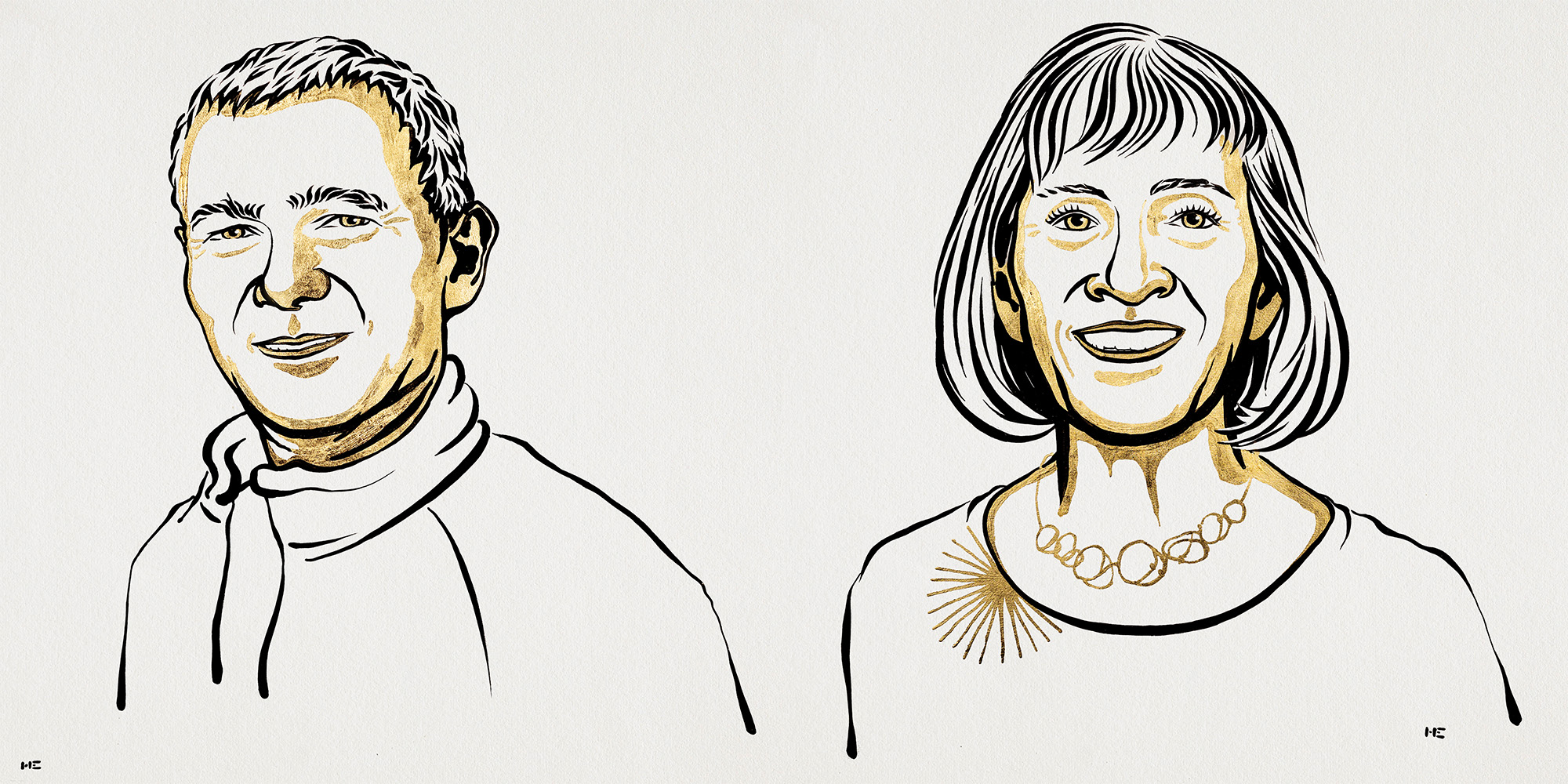
Moungi G. Bawendi, PhD’88, and Claudia Goldin, AM’69, PhD’72, are among the newest Nobel laureates. (Illustrations by Niklas Elmehed © Nobel Prize Outreach)
Two alumni were recognized with 2023 Nobel Prizes.
On October 4 Moungi G. Bawendi, PhD’88, received a share of the 2023 Nobel Prize in Chemistry. Five days later, economic historian and labor scholar Claudia Goldin, AM’69, PhD’72, received the 2023 Sveriges Riksbank Prize in Economic Sciences in Memory of Alfred Nobel. The two became the 98th and 99th Nobelists who were UChicago faculty members, students, or researchers at some point in their careers.
Bawendi shared the prize with Louis E. Brus and Alexei I. Ekimov. The Royal Swedish Academy of Sciences cited the trio’s research on quantum dots—nanoscale crystals so small that their properties are determined by the laws of quantum mechanics. Quantum dots are used today in televisions, medical imaging, LED lighting, and more, but before Bawendi’s groundbreaking work, it was not clear that they could be refined enough to prove useful. In 1993 Bawendi “revolutionised the chemical production of quantum dots,” the academy said, “resulting in almost perfect particles. This high quality was necessary for them to be utilised in applications.”
In the 1980s at Bell Laboratories, Bawendi and fellow Nobelist Brus researched quantum dots with UChicago president Paul Alivisatos, AB’81, also a pioneer in nanotechnology. At UChicago Bawendi worked on polymer theory with Karl Freed, now the Henry G. Gale Distinguished Service Professor Emeritus in Chemistry. He then conducted experiments on molecular ion spectroscopy with Takeshi Oka, now the Robert A. Millikan Distinguished Service Professor Emeritus in Astronomy and Astrophysics and Chemistry.
Calling the award “an honor and a surprise,” Bawendi pointed to quantum dots’ continuing promise. “Over the years, you know, many of us in the field kept thinking, ‘When is this going to end?’ But the field just keeps on giving, and it’s been really amazing to see that.”
Claudia Goldin’s prize came “for having advanced our understanding of women’s labour market outcomes,” the academy said. Her ongoing research on women’s experiences in the workforce has yielded important insights into the gap between men’s and women’s wages. She became the first woman to win the economics Nobel solo (two women previously won a share of the prize: Elinor Ostrom in 2009 and Esther Duflo in 2019).
Goldin’s studies in economics cover a range of topics. She compares her scholarly methods to those of Sherlock Holmes, with her clues coming from data and historical archives. She absorbed the historical approach from one of her UChicago mentors, Robert Fogel, the 1993 Nobel laureate in economics; the 1992 winner, Gary Becker, AM’53, PhD’55, served as another formative influence. “Her research follows very naturally from the mesh between Fogel and Becker, and obviously builds hugely on what they had done,” said Robert Shimer, chair of the Kenneth C. Griffin Department of Economics. “She’s done absolutely amazing things.”
Goldin’s landmark work Understanding the Gender Gap: An Economic History of American Women (Oxford University Press, 1990) heavily relied on little-known records in the National Archives to ground its story of constant change in women’s work over the 19th and 20th centuries. By that account, change has not been linear and wage discrimination is one among many factors in the persistent gap between men’s and women’s pay.
“It certainly means a tremendous amount,” Goldin said of her Nobel win. “It also means a lot because it’s an award for big ideas and for long-term change.”
